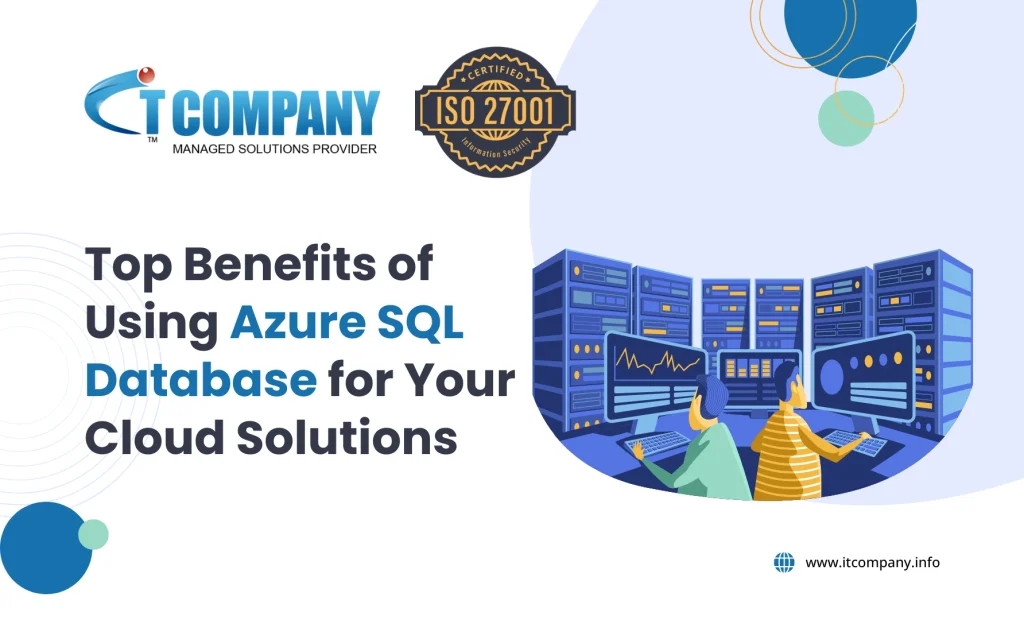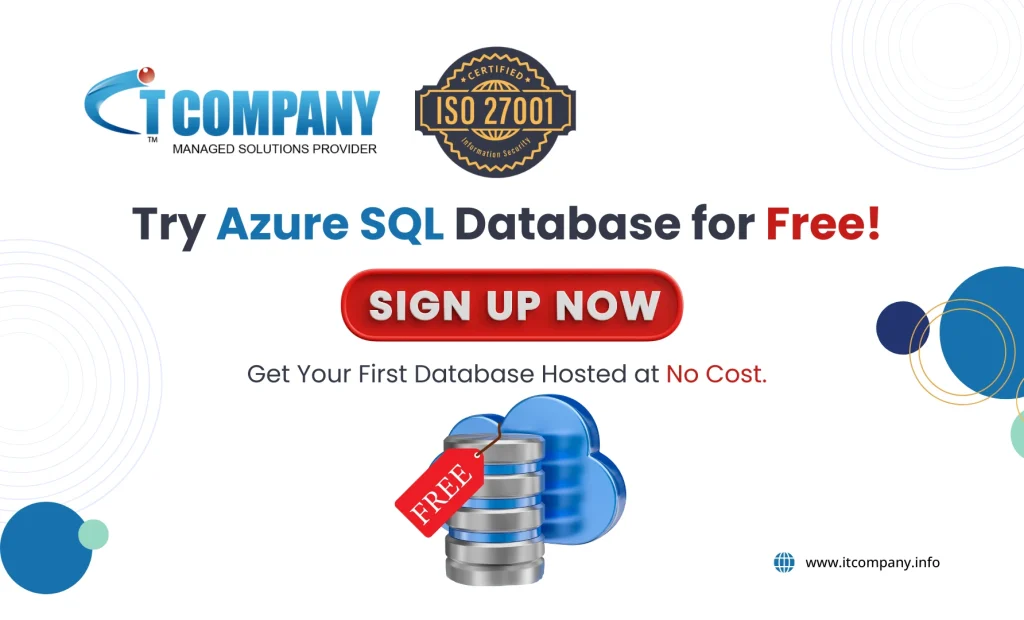
Azure SQL database is one of important factor in enhancing flexibility, scalability and cost-efficiency. It offers fully managed relational database service and is powerful enough to provide you almost everything you need to run business critical mobile applications without worrying about infrastructure management.
In this article, we’ll explore the top benefits of using Azure SQL Database for your cloud-based solutions and how it can help streamline your database management.
Table of Contents
ToggleFully Managed Service
One of the most significant advantages of Azure SQL Database is that it is fully managed. Microsoft takes care of all the database maintenance tasks such as:
- Patching
- Backups
- Performance tuning
- Security updates
With Azure SQL Database, you don’t need to worry about the complexities of hardware provisioning or managing SQL Server instances. This allows your team to focus more on building innovative applications and less on the maintenance of the database infrastructure.
The automated backups updates and high availability features ensure that your database is secure and always accessible, even in the case of failures.
2. Scalability and Flexibility
Azure SQL Database is designed to handle varying workloads with elastic scalability. Whether your database needs to handle a small number of transactions or scale to millions of requests per second, Azure SQL provides an easy way to adjust performance on-demand.
Azure SQL Database offers two types of scaling options:
- Vertical scaling: You can scale up or down the compute resources (CPU and RAM) to adjust performance based on your application’s needs.
- Horizontal scaling: Azure SQL provides elastic pools, allowing multiple databases to share resources, making it easier to scale and manage a large number of databases.
This on-demand scalability ensures that businesses only pay for the resources they need, optimizing costs while meeting performance requirements.
3. Built-in Intelligence and Performance Optimization
Azure SQL Database leverages built-in intelligence to optimize database performance. It uses advanced machine learning algorithms and adaptive query processing to continuously tune queries for optimal performance.
Features like:
- Automatic indexing
- Query store for performance insights
- Dynamic resource management
allow your database to automatically adapt to changing workloads and optimize performance without manual intervention. Azure SQL Database also offers advanced features like intelligent insights that provide actionable performance recommendations, helping you identify and resolve bottlenecks proactively.
4. Advanced Security Features
When moving to the cloud, web security is always a top concern. Azure SQL Database offers enterprise-grade security features to ensure your data is protected. Some of the key security features include:
- Advanced Threat Protection: This detects unusual activity, potential vulnerabilities, and suspicious behavior to help protect your data.
- Encryption: Both at rest and in transit, using industry-standard encryption mechanisms (e.g., TDE – Transparent Data Encryption).
- Firewall and Virtual Network Integration: You can configure your Azure SQL Database to only allow access from specific IP addresses or integrate with your existing network security infrastructure. It integrates easily with firewall and virtual networks.
Additionally, Azure offers multi-factor authentication (MFA), Azure Active Directory (AAD) integration, and role-based access control (RBAC) to manage who can access your database and what actions they can perform.
5. High Availability and Disaster Recovery
Azure SQL Database is designed to provide high availability (HA) with 99.99% uptime SLAs. It supports built-in geo-replication to ensure your data is available even if a regional failure occurs. Some of the high-availability features include:
- Active Geo-Replication: Replicate your database to up to four readable secondary databases across different Azure regions.
- Automatic Failover: In case of a failure, Azure SQL Database automatically switches to the secondary replica to minimize downtime.
The combination of these features guarantees that your application remains up and running, even during unexpected failures and second disaster recovery plan, without requiring manual intervention.
6. Cost-Efficiency
Azure SQL Database offers various pricing models to help businesses manage costs. There are options to suit different workloads:
- vCore-based purchasing model: Allows you to select compute and storage resources separately, offering more transparency in pricing and better control over costs.
- DTU-based purchasing model: The Database Transaction Unit (DTU) model bundles compute, memory, and I/O resources into a single price.
Azure also provides the option to scale resources up and down based on usage, meaning you pay only for the resources you use. This level of cost optimization is a huge benefit, particularly for businesses with fluctuating database workloads.
7. Seamless Integration with Other Azure Services
Azure SQL Database integrates seamlessly with a wide array of other Azure services, such as Azure Functions, Azure Logic Apps, and Power BI. This makes it easy to build end-to-end cloud applications and data pipelines.
For example, you can use Azure Logic Apps to automate workflows that interact with your database or use Power BI to create data visualizations and reports based on your SQL database data. This integration simplifies the process of building data-driven applications, allowing you to make the most of the Azure ecosystem.
8. Support for Hybrid Environments

Many enterprises operate in hybrid environments, where some resources are in the cloud and others are on-premises. Azure SQL Database supports hybrid architectures through Azure Arc and SQL Server on Azure Virtual Machines.
With Azure Arc, businesses can manage databases across on-premises, multi-cloud, and edge environments from a single control plane. This flexibility is essential for organizations that want to maintain consistency and control across different deployment models while leveraging the cloud’s benefits.
Conclusion
Azure SQL Database provides a wealth of benefits for businesses looking to build, manage, and scale cloud solutions. From its fully managed nature to built-in intelligence, advanced security, and seamless integration with other Azure SQL services, it stands as a robust and reliable solution for modern cloud-based applications.
By choosing Azure SQL Database, businesses can enjoy the following key advantages:
| Benefit | Description |
|---|---|
| Fully Managed Service | Hands-off maintenance and management. |
| Scalability and Flexibility | Scale up or down based on workload requirements. |
| Built-in Intelligence | AI-driven optimization and performance tuning. |
| Advanced Security Features | Robust encryption, threat protection, and access control. |
| High Availability and DR | Geo-replication, automatic failover, and 99.99% SLA. |
| Cost-Efficiency | Flexible pricing models and on-demand scaling. |
| Integration with Azure Ecosystem | Seamless connection with Azure services like Logic Apps and Power BI. |
| Support for Hybrid Environments | Hybrid cloud deployments and management. |
With these features, Azure SQL Database provides businesses with a powerful tool for managing and scaling their databases while keeping costs under control and ensuring performance, security, and high availability. Whether you’re a small startup or a large enterprise, Azure SQL Database can help you build efficient, cost-effective cloud solutions that meet your business needs.